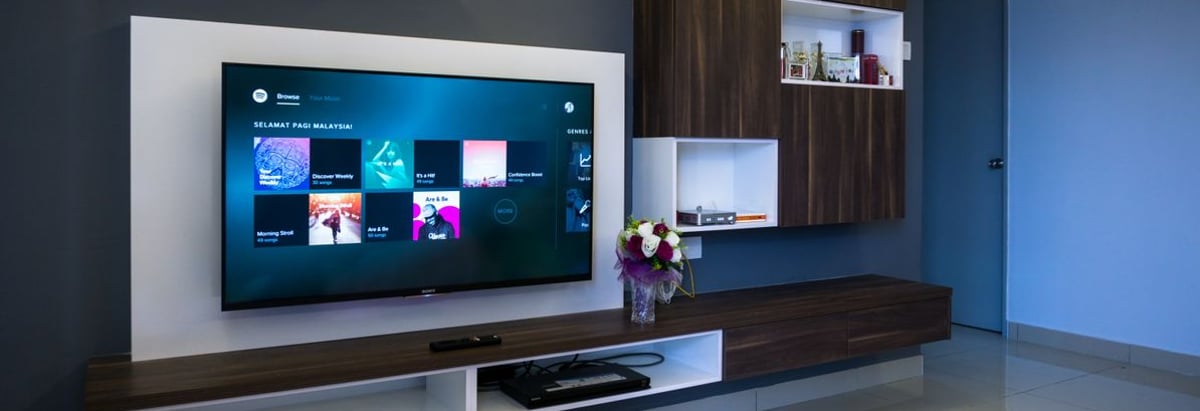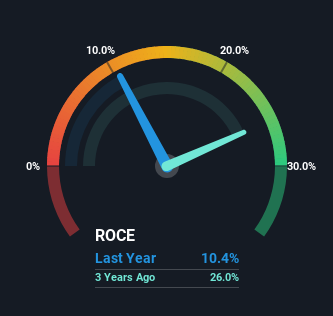- Hong Kong
- /
- Consumer Durables
- /
- SEHK:1747
Home Control International (HKG:1747) Is Reinvesting At Lower Rates Of Return

To find a multi-bagger stock, what are the underlying trends we should look for in a business? Typically, we'll want to notice a trend of growing return on capital employed (ROCE) and alongside that, an expanding base of capital employed. Put simply, these types of businesses are compounding machines, meaning they are continually reinvesting their earnings at ever-higher rates of return. Although, when we looked at Home Control International (HKG:1747), it didn't seem to tick all of these boxes.
Understanding Return On Capital Employed (ROCE)
Just to clarify if you're unsure, ROCE is a metric for evaluating how much pre-tax income (in percentage terms) a company earns on the capital invested in its business. Analysts use this formula to calculate it for Home Control International:
Return on Capital Employed = Earnings Before Interest and Tax (EBIT) ÷ (Total Assets - Current Liabilities)
0.10 = US$3.9m ÷ (US$72m - US$35m) (Based on the trailing twelve months to June 2023).
Thus, Home Control International has an ROCE of 10%. By itself that's a normal return on capital and it's in line with the industry's average returns of 10%.
Check out our latest analysis for Home Control International

Above you can see how the current ROCE for Home Control International compares to its prior returns on capital, but there's only so much you can tell from the past. If you'd like, you can check out the forecasts from the analysts covering Home Control International for free.
How Are Returns Trending?
On the surface, the trend of ROCE at Home Control International doesn't inspire confidence. Over the last five years, returns on capital have decreased to 10% from 32% five years ago. Given the business is employing more capital while revenue has slipped, this is a bit concerning. This could mean that the business is losing its competitive advantage or market share, because while more money is being put into ventures, it's actually producing a lower return - "less bang for their buck" per se.
On a related note, Home Control International has decreased its current liabilities to 48% of total assets. That could partly explain why the ROCE has dropped. Effectively this means their suppliers or short-term creditors are funding less of the business, which reduces some elements of risk. Some would claim this reduces the business' efficiency at generating ROCE since it is now funding more of the operations with its own money. Either way, they're still at a pretty high level, so we'd like to see them fall further if possible.
The Bottom Line On Home Control International's ROCE
From the above analysis, we find it rather worrisome that returns on capital and sales for Home Control International have fallen, meanwhile the business is employing more capital than it was five years ago. Long term shareholders who've owned the stock over the last three years have experienced a 58% depreciation in their investment, so it appears the market might not like these trends either. With underlying trends that aren't great in these areas, we'd consider looking elsewhere.
If you want to know some of the risks facing Home Control International we've found 3 warning signs (2 shouldn't be ignored!) that you should be aware of before investing here.
While Home Control International may not currently earn the highest returns, we've compiled a list of companies that currently earn more than 25% return on equity. Check out this free list here.
Valuation is complex, but we're here to simplify it.
Discover if Home Control International might be undervalued or overvalued with our detailed analysis, featuring fair value estimates, potential risks, dividends, insider trades, and its financial condition.
Access Free AnalysisHave feedback on this article? Concerned about the content? Get in touch with us directly. Alternatively, email editorial-team (at) simplywallst.com.
This article by Simply Wall St is general in nature. We provide commentary based on historical data and analyst forecasts only using an unbiased methodology and our articles are not intended to be financial advice. It does not constitute a recommendation to buy or sell any stock, and does not take account of your objectives, or your financial situation. We aim to bring you long-term focused analysis driven by fundamental data. Note that our analysis may not factor in the latest price-sensitive company announcements or qualitative material. Simply Wall St has no position in any stocks mentioned.
About SEHK:1747
Home Control International
An investment holding company, provides home control solutions in North America, Europe, Asia, and Latin America.
Flawless balance sheet and good value.
Similar Companies
Market Insights
Community Narratives



